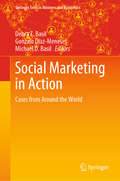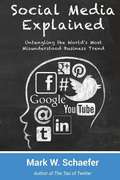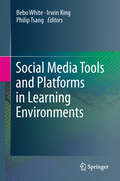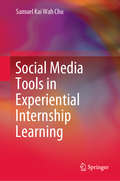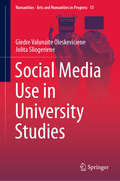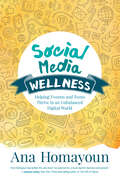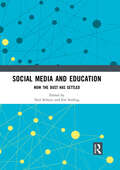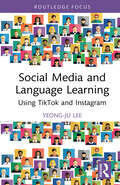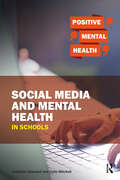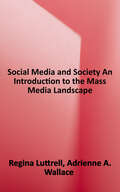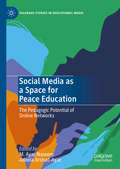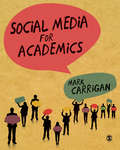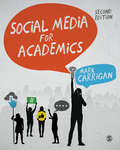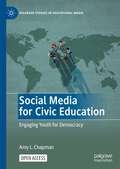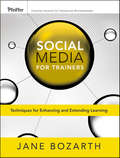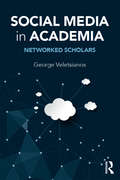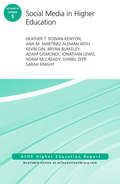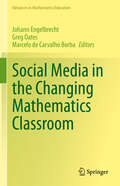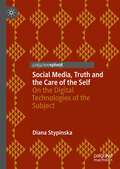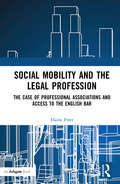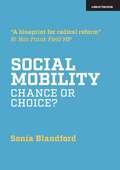- Table View
- List View
Social Marketing in Action: Cases from Around the World (Springer Texts in Business and Economics)
by Debra Z. Basil Gonzalo Diaz-Meneses Michael D. BasilThis textbook provides students with real-world social marketing case studies from different countries and regions around the world, taking learners from classroom theory to practice. The primary objective is to clearly portray to students distinct, identifiable steps that are essential for successful social marketing campaigns. Core social marketing practices are applied to each case to help students master social marketing principles and apply them to their own real world social marketing activities in order to affect positive social change. This textbook first provides the tools necessary to understand the effective applica- tion of social marketing, and then offers 24 case studies exemplifying effective social marketing efforts from all around the world. Specifically, Part I clearly and concisely explains the principles of social marketing in five chapters: • Upstream vs. downstream social marketing, SWOT, competition • Fundamentals of social marketing, ethics • Formative and Evaluative Research • Theories applied in social marketing • A historical perspective on social marketing Part II features 24 social marketing case studies that demonstrate the application of social marketing principles. All 24 cases follow a consistent structure that includes: • Background • Positioning • SWOT • Research • Objectives • The 4 P’s • Target audience • Evaluation • Barriers and benefits • Discussion • Competition This format allows for students and professors to easily and effectively select individual cases and compare between cases. This textbook also allows instructors to encourage critical thinking by having students compare and contrast not only the cases themselves, but the applications used. In addition, teaching guides with answers to discussion questions, suggestions for activities inside and outside of the classroom and further readings are available to assist professors in teaching from this book.
Social Media Explained: Untangling the Worlds Most Misunderstood Business Trend
by Mark W. SchaeferIt explores the fundamental strategies and answers the biggest questions every business professional needs to answer before diving into a social media initiative The is the must-have guide for understanding the sociological and psychological drivers that make social media marketing work.
Social Media Tools and Platforms in Learning Environments
by Irwin King Bebo White Philip TsangOnline social media have transformed the face of human interaction in the 21st century. Wikis, blogs, online groups and forums, podcasts, virtual worlds, and social tagging are but a few of the applications enabling innovative behaviors that support acquisition, access, manipulation, retrieval, and visualization of information. It is, therefore, no surprise that educational practitioners and theorists have begun to explore how social media can be harnessed to describe and implement new paradigms for communication, learning, and education. The editors' goal in publishing this book was to identify original research on the application of online social media and related technologies in education as well as emerging applications in Web technologies that could provide and shape future educational platforms. The selected contributions deal with questions such as how social media can truly enrich and enhance learning and teaching experiences in ways not otherwise possible; how learning can be integrated in a distributed and ubiquitous social computing environment; or what theories, paradigms, and models are applicable for the support of social computing in education. Researchers in education or educational software will find interesting and sometimes provocative chapters on paradigms and methodologies, virtual and mobile learning spaces, and assessment and social factors. Practitioners in these fields will benefit from an additional section devoted to case studies and first experience reports.
Social Media Tools in Experiential Internship Learning
by Samuel Kai ChuThis book describes how a support structure can be built to enhance peer-to-peer (and also students-to-lecturers) communication and support. It informs lecturers on how they can decide if they should adopt one or more social media tools to facilitate students’ learning, communication, and support for an internship program. This book introduces a participatory design approach that can help develop a pedagogy that will make good use of social media tools on internship learning. It presents a framework for experiential internship learning, integrating helpful educational practices such as participatory design approach and the use of social media.
Social Media Use in University Studies (Numanities - Arts and Humanities in Progress #13)
by Jolita Sliogeriene Giedre Valunaite OleskevicieneThis book highlights the phenomenon of social media use in university studies based on its participants’ lived experience. It will appeal both to academics and practitioners interested in the human factors in the study environments saturated with technologies of social media. This book reveals multiple, sometimes contradictory dimensions of the phenomenon. The contradictions acquire a binary Janus-faced characteristic of uncertainty and paradox. Social media use in university studies also causes changes in experiencing time, space and relations. Teacher research participants sometimes perceive their time as stress or an additional load, which shows that social media use in university studies demands a new approach to teacher workload and its regulation. There is also the necessity of the sensitive democratic teacher—student pedagogical relationship. This book proves that the pedagogical relationship and human creativity essentially belong to the human living world and are still at the heart of the technological “cyborgian” existence.
Social Media Wellness: Helping Tweens and Teens Thrive in an Unbalanced Digital World (Corwin Teaching Essentials)
by Ana HomayounSolutions for navigating an ever-changing social media world Today’s students face a challenging paradox: the digital tools they need to complete their work are often the source of their biggest distractions. Students can quickly become overwhelmed trying to manage the daily confluence of online interactions with schoolwork, extracurricular activities, and family life. Written by noted author and educator Ana Homayoun, Social Media Wellness is the first book to successfully decode the new language of social media for parents and educators and provide pragmatic solutions to help students: Manage distractions Focus and prioritize Improve time-management Become more organized and boost productivity Decrease stress and build empathy With fresh insights and a solutions-oriented perspective, this crucial guide will help parents, educators and students work together to promote healthy socialization, effective self-regulation, and overall safety and wellness. "Ana Homayoun has written the very book I’ve yearned for, a must-read for teachers and parents. I have been recommending Ana’s work for years, but Social Media Wellness is her best yet; a thorough, well-researched and eloquent resource for parents and teachers seeking guidance about how to help children navigate the treacherous, ever-changing waters of social media and the digital world." —Jessica Lahey, Author of The Gift of Failure "This is the book I’ve been waiting for. Ana Homayoun gives concrete strategies for parents to talk with their teens without using judgment and fear as tools. This is a guidebook you can pick up at anytime, and which your teen can read, too. I’ll be recommending it to everyone I know." —Rachel Simmons, Author of The Curse of the Good Girl
Social Media Wellness: Helping Tweens and Teens Thrive in an Unbalanced Digital World (Corwin Teaching Essentials)
by Ana HomayounSolutions for navigating an ever-changing social media world Today’s students face a challenging paradox: the digital tools they need to complete their work are often the source of their biggest distractions. Students can quickly become overwhelmed trying to manage the daily confluence of online interactions with schoolwork, extracurricular activities, and family life. Written by noted author and educator Ana Homayoun, Social Media Wellness is the first book to successfully decode the new language of social media for parents and educators and provide pragmatic solutions to help students: Manage distractions Focus and prioritize Improve time-management Become more organized and boost productivity Decrease stress and build empathy With fresh insights and a solutions-oriented perspective, this crucial guide will help parents, educators and students work together to promote healthy socialization, effective self-regulation, and overall safety and wellness. "Ana Homayoun has written the very book I’ve yearned for, a must-read for teachers and parents. I have been recommending Ana’s work for years, but Social Media Wellness is her best yet; a thorough, well-researched and eloquent resource for parents and teachers seeking guidance about how to help children navigate the treacherous, ever-changing waters of social media and the digital world." —Jessica Lahey, Author of The Gift of Failure "This is the book I’ve been waiting for. Ana Homayoun gives concrete strategies for parents to talk with their teens without using judgment and fear as tools. This is a guidebook you can pick up at anytime, and which your teen can read, too. I’ll be recommending it to everyone I know." —Rachel Simmons, Author of The Curse of the Good Girl
Social Media and Education: Now the Dust Has Settled
by Neil Selwyn; Eve StirlingSocial media are now established as an important aspect of contemporary education. We live in times where social media applications such as Facebook, Twitter, Tumblr and Snapchat are mainstream educational tools; where most new educational technologies claim to have a ‘social’ element; and it increasingly makes no sense to distinguish between learning ‘online’ and ‘offline’. It studies users' experiences and views of social media; addresses questions of equality and diversity concerning who is doing what with social media; examines how the use of social media applications sits alongside pre-existing cultures and structures of schooling; and brings to light the unintended and unexpected results of social media in education. Altogether, this collection of writing provides a nuanced and interesting discussion of the realities of social media use across different aspects of education.This book was originally published as a special issue of Learning, Media and Technology.
Social Media and Language Learning: Using TikTok and Instagram (Routledge Research in Language Education)
by Yeong-Ju LeeThis book explores creative uses of social media for informal language learning. It focuses on the underexplored area of how informal language learning adapts to technological innovations in two multimodal media-sharing platforms: TikTok and Instagram.Drawing on ecological perspectives of language learning and spatial understandings of digital technology and learning, the research reported in this book unpacks how social media technologies are used for language learning. It presents insights from a dual-level qualitative methodological design: a comparative study of public online data of social media posts collected from TikTok and Instagram, and a multiple case study based on ethnographic narrative data gathered from participants’ journal entries, stimulated recall interviews, and social media posts. This book reveals the dynamic landscape of digital language learning that is being integrated into learners’ everyday lives through multimodal content creation and networking.This book enriches readers’ understanding of social media’s role in language learning, and offers pedagogical strategies for teachers to integrate newer technologies and multimodal materials into language classrooms to enhance students’ learning experiences.
Social Media and Mental Health in Schools (Positive Mental Health)
by Jonathan Glazzard Colin MitchellSocial media is at the heart of children’s and young people’s lives. It is intimately entwined with mental health issues and can be both a blessing and a curse. Do you fully understand the links between social media and mental health? What problems does social media present for your learners? What benefits could it bring them? What can you do to educate children and young people about the use of social media while also developing their digital resilience? Whether you are a primary or secondary teacher, this book helps you tackle these questions, with a range of practical strategies and solutions that are workable in school and classroom settings.
Social Media and Society: An Introduction to the Mass Media Landscape
by Regina Luttrell Adrienne A. WallaceRegina Luttrell and Adrienne A. Wallace present an engaging introduction to social media's integration with modern society. Recognizing categories of relational, societal, and self while analyzing the social media environment, this introductory mass communications textbook establishes a framework for understanding how technology, culture, democracy, economy, and audience fragmentation interact with each media industry differently and relate to media literacy. Armed with this knowledge, future professional communicators gain a better understanding of their audience and the level to which their strategies influence the public. The text empowers students as consumers and creators of social media and illustrates that, while the tools of communication have changed, the goals of social connection and influence have not. Features of this unique text include the following: - Relational/Societal/Self boxes provide a framework for analysis of media and society - In Theory boxes attaching theory to practice - Learning tools and enhanced pedagogy, such as Learning Objectives, Chapter Wrap-Up; Critical Thinking Questions, Media Sources, and End of Chapter Activities - Comprehensive Glossary of key terms - Full-color visuals capturing key trends and up-to-date data
Social Media as a Space for Peace Education: The Pedagogic Potential of Online Networks (Palgrave Studies in Educational Media)
by M. Ayaz Naseem Adeela Arshad-AyazThis book explores the potential of social media as a space for teaching and bringing about sustainable peace. Using cutting-edge research, the editors and authors analyze the fundamental transformations taking place in the digital and interactive public sphere, most recently with the advent of the ‘post-truth’ age and the impact of this upon young people’s perceptions of ‘friend’ and ‘foe’. Peace initiatives at almost every level recognize the importance of education for sustainable peace: this volume examines the opportunities emerging from these societal transformations for both formal and informal education. This book will appeal to students and scholars of social media, peace education and the post-truth age.
Social Media for Academics
by Mark CarriganSocial media is an increasingly important part of academic life that can be a fantastic medium for promoting your work, networking with colleagues and for demonstrating impact. However, alongside the opportunities it also poses challenging questions about how to engage online, and how to represent yourself professionally. This practical book provides clear guidance on effectively and intelligently using social media for academic purposes across disciplines, from publicising your work and building networks to engaging the public with your research. It is supported by real life examples and underpinned by principles of good practice to ensure you have the skills to make the most of this exciting medium. You’ll find advice on: Using social media to publicise your work Potential pitfalls and how to avoid them The evolving role of social media in higher education Defining digital scholarship Managing your identity online Finding time for social media Near-future trends in academia. Visit Mark's blog for more insights and discussion on social media academic practice at http://markcarrigan.net/
Social Media for Academics
by Mark CarriganSocial media is an increasingly important part of academic life that can be a fantastic medium for promoting your work, networking with colleagues and for demonstrating impact. However, alongside the opportunities it also poses challenging questions about how to engage online, and how to represent yourself professionally. This practical book provides clear guidance on effectively and intelligently using social media for academic purposes across disciplines, from publicising your work and building networks to engaging the public with your research. It is supported by real life examples and underpinned by principles of good practice to ensure you have the skills to make the most of this exciting medium. You'll find advice on: Using social media to publicise your work Potential pitfalls and how to avoid them The evolving role of social media in higher education Defining digital scholarship Managing your identity online Finding time for social media Near-future trends in academia. Visit Mark's blog for more insights and discussion on social media academic practice at http://markcarrigan.net/
Social Media for Academics
by Mark CarriganSocial media has become an inescapable part of academic life. It has the power to transform scholarly communication and offers new opportunities to publish and publicise your work, to network in your discipline and beyond and to engage the public. However, to do so successfully requires a careful understanding of best practice, the risks, rewards and what it can mean to put your professional identity online. Inside you'll find practical guidance and thoughtful insight on how to approach the opportunities and challenges that social media presents in ways that can be satisfying and sustainable as an academic. The guide has been updated throughout to reflect changes in social media and digital thinking since the last edition, including: The dark side of social media – from Trump to harassment Emerging forms of multimedia engagement – and how to use to your advantage Auditing your online identity – the why and how Taking time out – how to do a social media sabbatical. Visit Mark's blog for more insights and discussion on social media academic practice.
Social Media for Academics
by Mark CarriganSocial media has become an inescapable part of academic life. It has the power to transform scholarly communication and offers new opportunities to publish and publicise your work, to network in your discipline and beyond and to engage the public. However, to do so successfully requires a careful understanding of best practice, the risks, rewards and what it can mean to put your professional identity online. Inside you'll find practical guidance and thoughtful insight on how to approach the opportunities and challenges that social media presents in ways that can be satisfying and sustainable as an academic. The guide has been updated throughout to reflect changes in social media and digital thinking since the last edition, including: The dark side of social media – from Trump to harassment Emerging forms of multimedia engagement – and how to use to your advantage Auditing your online identity – the why and how Taking time out – how to do a social media sabbatical. Visit Mark's blog for more insights and discussion on social media academic practice.
Social Media for Civic Education: Engaging Youth for Democracy (Palgrave Studies in Educational Media)
by Amy L. ChapmanThis open access book provides the theoretical and pedagogical foundations for a promising new approach to civic education: using social media to teach civics. While many measures indicate that youth civic engagement has long been in decline, many of these measures fail to take into account all of the ways that youth can interact with civic life. One of these understudied ways is through social media, including platforms like Twitter, where young people have the opportunity to encounter the news, engage with people in power, and bring attention to the needs in their community. Throughout this volume, Chapman explores how and why teachers can use social media to teach civics, as well as how it might meet the needs of students in ways other approaches do not.
Social Media for School Leaders: A Comprehensive Guide to Getting the Most Out of Facebook, Twitter, and Other Essential Web Tools
by Brian DixonHow to create an effective social media strategy for a school or district School leaders may be familiar with social media in their own lives, but many still need help in effectively using social media in their professional practice. In this book, Brian Dixon, an expert in social media in education, offers detailed descriptions of the best online tools available today and provides step-by-step instructions for using them to move a school community from awareness to advocacy and from feedback to collaboration. Offers school leaders everything they need to implement social media throughout their campus and their communities Contains expert advice for creating a sustainable social engagement strategy Features screenshots and examples from schools and individuals who are using social media to the best effect This important resource can help savvy school leaders shift their leadership strategy from communicating to connecting.
Social Media for Trainers: Techniques for Enhancing and Extending Learning
by Jane BozarthNew social media technologies and strategies provide quick, easy solutions to many of the challenges faced by workplace training practitioners. Social media vehicles such as Twitter and Facebook, for example, can help trainers build learning communities, facilitate quick assignments, offer updates or follow-up tips, and otherwise extend the reach of the formal training event. Social Media for Trainers is the first how-to guide on the incorporation of social networking techniques into a trainer's repertoire. It covers the most popular Web 2. 0 tools for instructor-created content (blogs), community-created content (wikis), micro-blogging (Twitter), and community sharing and interaction (Facebook), all with detailed instruction on conducting several training/training-related activities.
Social Media in Academia: Networked Scholars
by George VeletsianosSocial media and online social networks are expected to transform academia and the scholarly process. However, intense emotions permeate scholars’ online practices and an increasing number of academics are finding themselves in trouble in networked spaces. In reality, the evidence describing scholars’ experiences in online social networks and social media is fragmented. As a result, the ways that social media are used and experienced by scholars are not well understood. Social Media in Academia examines the day-to-day realities of social media and online networks for scholarship and illuminates the opportunities, tensions, conflicts, and inequities that exist in these spaces. The book concludes with suggestions for institutions, individual scholars, and doctoral students regarding online participation, social media, networked practice, and public scholarship.
Social Media in Higher Education: ASHE Higher Education Report, Volume 42, Number 5 (J-B ASHE Higher Education Report Series (AEHE))
by Heather T. Rowan-Kenyon Ana M. Martínez AlemánSocial media is central to postsecondary education. It is how students engage with the campus community, and campus leaders and practitioners are interested in how an institution can employ social media to impact instruction, student services and institutional effectiveness in an increasingly competitive market. This volume presents the current research and scholarship on social media that provides a view of the higher education landscape in this new digital age and it demonstrates how social media influence behavior and campus culture. Drawing on a critical synthesis and analysis from recent research on this rapidly evolving phenomenon, this monograph examines: some of the assumptions and presumptions around social media, how social media is used and how it shapes the student experience and student development, and best practices for enhancing curricular and co-curricular communities of practice. This is the 5th issue of the 42nd volume of the Jossey-Bass series ASHE Higher Education Report. Each monograph is the definitive analysis of a tough higher education issue, based on thorough research of pertinent literature and institutional experiences. Topics are identified by a national survey. Noted practitioners and scholars are then commissioned to write the reports, with experts providing critical reviews of each manuscript before publication.
Social Media in the Changing Mathematics Classroom (Advances in Mathematics Education)
by Johann Engelbrecht Greg Oates Marcelo de Carvalho BorbaThis edited volume gathers contributions from international scholars focusing on social media's role and impact on mathematics education. Social media's integration into pedagogical strategies (from social networking sites to video-sharing platforms) offers the opportunity to enhance learning by fostering connectivity and engagement among students, ultimately improving mathematical understanding in educational settings. This text aims to provide guidance on the facilitation of peer learning and collaboration, as well as highlighting the necessary shift in traditional methods to include cyber assistance in the learning process. The book discusses how social media aligns with social-constructivist theories of learning, its consistency with the process of developing students into independent learners and provides means to ensuring educators remain relevant and connected to students' preferred modes of learning. Challenges and benefits of the use of social media tools in teaching are also detailed. Examining the potential for effective integration of social media in the classroom, this book is a valuable resource for educators, practitioners and researchers interested in mathematics education.
Social Media, Truth and the Care of the Self: On the Digital Technologies of the Subject
by Diana StypinskaThis book explores the relationship between (post)truth and subjectivity by focusing on social media as a site of digital subjectification. These days, truth is cheap. Anyone can claim it. Indeed, most do – impudently and without any recourse to facts or objective reality. Truth-claims today are nothing but power grabs, employed in the permanent popularity contest that our culture and politics have become. Correspondingly, our very sense of reality is perpetually uprooted. Post-truth sets us adrift. Navigating by smartphones, we pursue endless mirages, coming to wonder whether the shoreline itself is a myth. The book examines the ways in which different digital practices – such as influencing, trolling and digital activism – operate as technologies of the subject, shaping how we relate to ourselves, others and the world. It argues that social media facilitates the progressive eclipsing of our subjective (dis)positions by the economic imperative. Positioning post-truth as the outcome of unbridled economicization, it exposes the true costs of its supremacy. The critical reflections on the relationship between digital subjectification and the social offered by this book will be of relevance to academics and students working in the fields of sociology, media and cultural studies, politics, and philosophy.
Social Mobility and the Legal Profession: The case of professional associations and access to the English Bar
by Elaine FreerThis book will be crucial reading for students across a variety of disciplines. A broadly socio-legal text, using a mixed-methods design combining grounded theory with an in-depth case study, this research explores a rarely-seen facet of the legal profession. Sociologists studying the practical effect of sociological concepts from theorists such as Bourdieu and Weber; those studying the legal profession from the sociological, law or psychological angles; anyone examining elite professions; management students examining the operation of professional associations and the ways in which these mobilise to take action on controversial topics; those studying the role and creation of outreach: all will find something of interest in this monograph. For those within the legal profession itself it also provides a look into an oft-hidden world: that of the English Bar. A notoriously secretiveprofession, traditional, elite and suspicious of research – the case study evaluatingan outreach programme sheds light on how this fascinating world operates when trying to engage in progressive steps. Through the eyes of a professional association seeking to improve socio-economic diversity in the profession through instituting an access programme focussed on work experience, it examines not just how professional association action may succeed or fail, but why. With foreword by Lord Neuberger, former President of the Supreme Court and Chair of the Working Party on Entry to the Bar.
Social Mobility: Chance or Choice?
by Sonia BlandfordSocial Mobility: Chance or Choice?, a sequel to `Born to Fail? Social Mobility, a Working Class View' (October 2017), sets out the current chances and choices available for those considered by the establishment to need social mobility. Revisiting mutuality, Sonia Blandford asks whether we care enough as a society by considering the issues, solutions and impact to the education and social issues that push against the chance or choice of social mobility. Citing the views from interviews with education and business leaders, Social Mobility: Chance or Choice? reflects on the changing skillsets and capacities of workers required by employers, business and industry and the inescapable conclusion that the skillsets and capacities will continue to change in ways that are almost impossible for us to predict. In these contexts, we must question whether the traditional acme and 'recognised journey' of educational achievement – maximising university entrance – is still relevant or useful for working-class children and young people and children facing disadvantage. Apprenticeships, at their best, can offer an updated and forward-facing solution to the providing choice for working-class and all children and young people. Despite current policy developments to encourage meaningful apprenticeships, apprenticeship programmes are experiencing challenges. Social Mobility: Chance or Choice? argues that applied learning and work-based learning should be more accessible and available to all children and young people. If we are serious about unleashing the talent of all children and young people, regardless of their background, challenges or needs, we must consider new and innovative approaches to post-14 education. If we are to unleash the potential of all children and young people, the role of Further Education needs to be respected and understood. Quality Further Education and training in partnership with business is a credible answer to social mobility. Further Education is an underused but ideally placed sector to develop meaningful change for working-class young people, providing real chances and choices. Beginning with Leaders - professionals, practitioners, parents or carers, and members of society have a shared responsibility to ensure that all children and young people have a right to chance or choice and support these opportunities. Building a society that is truly inclusive.
